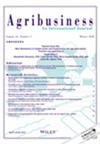Consumer acceptance and valuation of quality‐improved food products derived by genome editing technology. A case study of rice in Vietnam
IF 2.1
3区 经济学
Q2 AGRICULTURAL ECONOMICS & POLICY
引用次数: 0
Abstract
Unlike genetic modification, genome editing (GE) technologies can be used to yield transgene‐free outcomes, which is an important aspect in promoting consumer acceptance of GE foods. In addition, with the advent of the clustered regularly interspaced short palindromic repeats/Cas9 (CRISPR/Cas9) system, which is known to be exceptional among genome editing tools, GE has numerous potential applications in plant breeding technology to create diverse desirable traits, especially consumer‐targeted traits such as improved product quality and nutrition. It is expected that the GE foods market will overtake that of genetically modified (GM) foods. Although few GE products have been introduced to the market, some studies have already evaluated consumer acceptance and valuation of GE foods in comparison with GM and conventional foods. However, these studies mainly focused on traits relevant to cultivation efficiency and ignored consumer preferences for desirable traits. Further, it has been shown that consumers evaluate GE foods somewhat higher than GM foods; yet, as observed for GM foods, consumers expect a discounted price for GE foods. GE application for consumer‐targeted traits could, however, have a potentially positive effect on consumer acceptance. This study was conducted to evaluate consumer acceptance and valuation of quality‐improved consumer‐targeted GE products. We defined the determinants and estimated the willingness to pay a price premium for GE rice compared to GM and conventional rice by using the double‐bounded contingent valuation method under different information treatments. The survey was conducted in Vietnam, where consumers have not been exposed to information regarding GE via social media that could lead to a biased perspective. This context is ideal for investigating the effect of information provision during the introductory stage of GE products to the market. Our main findings suggest that consumers will widely accept quality‐improved GE foods targeted at consumer preferences, as well as the positive influence of in‐depth information provision on potential consumer acceptance. [EconLit Citations: Q10: Agriculture: General].消费者对通过基因组编辑技术提高食品质量的接受程度和评价。越南水稻案例研究
与转基因不同,基因组编辑(GE)技术可用于产生不含转基因的结果,这是促进消费者接受 GE 食品的一个重要方面。此外,众所周知,基因组编辑工具中的簇状规则间隔短回文重复序列/Cas9(CRISPR/Cas9)系统是出类拔萃的,随着该系统的出现,基因组编辑技术在植物育种技术中具有众多潜在应用,可创造出多种理想性状,特别是以消费者为目标的性状,如改善产品质量和营养。预计 GE 食品市场将超过转基因食品市场。虽然市场上推出的转基因产品很少,但一些研究已经评估了消费者对转基因食品与转基因食品和传统食品的接受程度和评价。然而,这些研究主要关注与种植效率相关的性状,而忽视了消费者对理想性状的偏好。此外,研究还表明,消费者对 GE 食品的评价略高于转基因食品;然而,正如对转基因食品所观察到的那样,消费者期望 GE 食品的价格会有折扣。然而,针对消费者目标性状的基因工程应用可能会对消费者的接受程度产生潜在的积极影响。本研究旨在评估消费者对以消费者为目标的质量改进型转基因产品的接受度和评价。我们定义了决定因素,并在不同的信息处理条件下,使用双约束或然估价法估算了与转基因大米和传统大米相比,消费者为转基因大米支付溢价的意愿。调查是在越南进行的,那里的消费者没有通过社交媒体接触过有关转基因的信息,这可能会导致他们的观点出现偏差。这种情况非常适合调查在通用电气产品进入市场的初始阶段提供信息的效果。我们的主要研究结果表明,消费者将广泛接受针对消费者偏好的质量改进型 GE 食品,以及深入的信息提供对潜在消费者接受度的积极影响。[经济学引文:Q10:农业:综合]。
本文章由计算机程序翻译,如有差异,请以英文原文为准。
求助全文
约1分钟内获得全文
求助全文
来源期刊

Agribusiness
农林科学-食品科技
CiteScore
5.50
自引率
6.20%
发文量
58
审稿时长
6 months
期刊介绍:
Agribusiness: An International Journal publishes research that improves our understanding of how food systems work, how they are evolving, and how public and/or private actions affect the performance of the global agro-industrial complex. The journal focuses on the application of economic analysis to the organization and performance of firms and markets in industrial food systems. Subject matter areas include supply and demand analysis, industrial organization analysis, price and trade analysis, marketing, finance, and public policy analysis. International, cross-country comparative, and within-country studies are welcome. To facilitate research the journal’s Forum section, on an intermittent basis, offers commentary and reports on business policy issues.
 求助内容:
求助内容: 应助结果提醒方式:
应助结果提醒方式:


